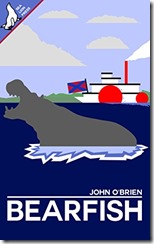Wildly audacious and entertaining, and deeply disappointing
 I would give it five stars for its entertainment and creativity, and one star for its unsatisfying delivery.
I would give it five stars for its entertainment and creativity, and one star for its unsatisfying delivery.
I truly loved the beginning of this book, which is the alternate history of the United States wherein a President Taft signs a bill to import hippopotamuses from Africa to the southern United States as a way to solve a problem with the food supply prior to WWII. The alternate part here is that the U.S. came very close to doing just this; the bill actually failed by just one vote.
What would happen if hippopotamuses were imported and, more importantly, naturalized and became a widespread “wild animal” in (at first) the South? Well, this story is a telling of such a thing happening.
It is told as if it were the recorded recollections of people in various regions and at various times, from the 1910s to the 1960s. Some people became successful due to the way they managed the presence of “bearfish” (or “river horses,” in other contexts) to their benefit, turning this wild animals into a source of meat for eating and fats for candles and soap-making. Others became successful because bearfish drove out conniving Northerners and carpetbaggers, leaving vast swaths free of intervention. Still others saw in bearfish a chance to form a new world free of capitalists.
It’s all done very well, with natural voices and idiosyncrasies in the story-telling.
But…
The fatal flaw is that this book is a set of stories that feels like the prequel to a novel that would be much deeper and more interesting and full of woven lives, rather than just a small set (maybe six?) stories, each a couple of pages, with no real connection to each other.
I want to know more about the disruption of society and the changes that would occur if bearfish were so invasive, destructive, and dangerous. I want to learn how people adapted and reacted to this. I want to understand how states could change their governance and their industries to either incorporate bearfish or to exterminate them.
I wanted so much more, and this book just…ended, a series of engaging vignettes that does not do much more than hint at a larger story.
There’s a great novel waiting to be written from these notes. There are people whose lives need to be explored and detailed. There is a huge story arc hidden here like the Real Presence in a communion wafer and thimble of wine.
I would hope the author sets his hand back to this story and fleshes it out. So much of the tale is still waiting to be told.
